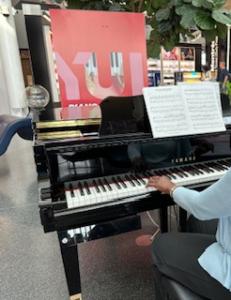
Have you ever heard anyone describe your voice as a musical instrument? Vinh Giang, a Vietnamese Australian magician- turned communication skills coach and founder of the Stage Academy, relates an experience where his coach advised him to think of his voice as a piano, which has 88 keys. She demonstrated this by playing the same note on the piano repeatedly and then playing a beautiful melody for comparison. Her point was clear: music is much richer and more expressive when a wider range of notes is played. In practice, this may mean playing a wider range of single notes or concurrently playing multiple notes for harmonization. In his training sessions, Vinh encourages speakers to vary their pitch and rate of speech in order to be more effective communicators.
What happens when the voice is lost?
When I was a faculty member at what was then a new medical school, a member of the charter class was scheduled to sing the national anthem at their graduation ceremony. As it turned out, she got sick – not too sick to attend the event, but sick enough to be unable to sing that day. Fortunately, one of her classmates was also a singer and sang in her place.
It’s one thing to lose one’s voice temporarily due to a minor ailment like a sore throat, but what happens when a person’s voice gets damaged permanently? I recently read a poignant essay that demonstrates the devastating impact such an event can have. In an essay titled “Silenced”, Dr. Donna Lambers, who practiced maternal/fetal medicine for twenty fours years, shares her experience after both of her recurrent laryngeal nerves (the nerves that supply the larynx or “voice box”) were paralyzed during a surgical operation. She writes about feeling as though her voice had literally been “cut out of her.” To make matters worse, she experienced a range of reactions from colleagues and patients alike. People joked about her microphone and others, not understanding her need for a headset, told her that she didn’t need it. The essay ends with the author stating that she has so many words trapped inside of her because they aren’t pleasant or easy to speak; she wonders who will listen to her now.
Giving a voice to the voiceless
In the bio accompanying the essay referenced above, the author states that although she had experience publishing research in academic publications, this was her first attempt at creative writing/personal storytelling. It then occurred to me that she may have lost her physical voice, but she has actually found another way to express herself – through writing, an “instrument” that can give a “voice” to the voiceless, in more ways than one. She described the process of writing the essay as being cathartic, demonstrating that writing can be beneficial to the writer as well as the reader.
An instrument for advocacy
In addition to telling our own stories, writing can be a powerful form of advocacy, bringing attention to issues that have previously been ignored. I often have to remind myself that the impact of writing is not always felt immediately. When I write about difficult topics like child abuse and abuse within religious settings, I am not just writing to tell a story, I am writing as an advocate. Sometimes we just need more people speaking out and writing about specific issues to bring about change. We can take comfort in these words:
“The arc of the moral universe is long, but it bends towards justice.”
As I mentioned in a previous essay, this quote is often attributed to Martin Luther King, Jr, though historians tell us that he was paraphrasing Theodore Parker, a 19th century abolitionist minister. While much progress has been made in terms of justice and equality, we still have a long way to go, but we can continue to use our “voices” to advocate for change.
Being a multi-instrumentalist for the greater good
I really believe that we are meant to use our God – given talents (instruments) to contribute to building a better society. So, whether it’s my “literal voice” that I use in speaking (and singing) or my “literary voice” in writing, the goal is to make a positive and lasting impact, and I need to keep working towards this goal, even if the results aren’t readily visible.













